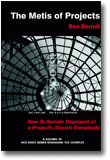
The Metis of Projects
How To Remain Cognizant of a Project’s (Social) Complexity
By:
J.B. Berndt
A volume in the series: ISCE Book Series: Managing the Complex. Editor(s): Michael Lissack, ISCE Research. Kurt A. Richardson, ISCE Research.
Published 2014
“The Metis of Projects” addresses veteran project manager Ben Berndt’s unease with the use of established (project) management frameworks given their general inefficacy. Despite the use of these frameworks, it is estimated that some 30% of projects still fail because they deliver too late, cost more than expected and/or lack quality. Often, projects and their environments are too complex to be controlled by rather linear frameworks. Where most practitioners define complexity as "complicated," most academics define complexity (more correctly) as interrelatedness. In recent years, the academic community has developed several "level-of-complexity frameworks;" however, these frameworks are not commonly known to practitioners and are therefore not regularly used. And, when examined further, these frameworks appear to be merely environmental scans, used to assess the level of complexity in the project management environment. But projects also carry inherent complexity; they are socially complex, and it is this social complexity that—paradoxically—needs management. Combined with personality assessments, social network theory is used here to glean a better understanding of the social complexity in a project. Berndt believes that, following Hugo Letiche and Michael Lissack's emergent coherence concept, managers should steer clear of frameworks in order to come to grips with the complex, and so he introduces whole systems methodologies, in which group understanding is used to continually set a next step. Berndt concludes his study by describing his multi-view, multi-tool participative project management style, which he thinks best aligns with (managing) the complex.
CONTENTS
Part A: In Search of the Metis of Projects 1. A Feeling of Unease. 2. The Project Management Arena. 3. Too Linear Project Management Frameworks. 4. Complex Project Management Frameworks. 5. Don’t Framework Your (Management) Life. Part B: An Attempt to Touch the Metis of Projects A Personal and Pragmatic Attempt to Touch the Metis of Projects. 6. Case Study X. Intermezzo: An Appreciative Inquiry Experiment. 7. Case Study Y. 8. Metis Mindfulness. 9. Afterwords. References. About the Author.
-
Paperback9781623967352
Web price: $45.04 (Reg. 52.99)
-
Hardcover9781623967369
Web price: $80.74 (Reg. 94.99)
- eBook9781623967376

- BUS041000 - BUSINESS & ECONOMICS: Management
- BUS087000 - BUSINESS & ECONOMICS: Production & Operations Management
- BUS055000 - BUSINESS & ECONOMICS: Reference
-
 Complexity and Knowledge Management
Understanding the Role of Knowledge in the Management of Social Networks
Complexity and Knowledge Management
Understanding the Role of Knowledge in the Management of Social Networks
-
 Dark and Destructive Leadership
Dark and Destructive Leadership
-
 Diversity, Equity, and Inclusion Insights in Practice
Diversity, Equity, and Inclusion Insights in Practice
-
 Making Healthcare Care
Managing via Simple Guiding Principles
Making Healthcare Care
Managing via Simple Guiding Principles
-
 Managing Organizational Complexity
Philosophy, Theory and Application
Managing Organizational Complexity
Philosophy, Theory and Application
-
 Organizations as Complex Systems
An Introduction to Knowledge Cybernetics
Organizations as Complex Systems
An Introduction to Knowledge Cybernetics
-
 The Entrepreneurship SIG at the European Academy of Management
Setting the Base for Tomorrow's Challenges
The Entrepreneurship SIG at the European Academy of Management
Setting the Base for Tomorrow's Challenges

